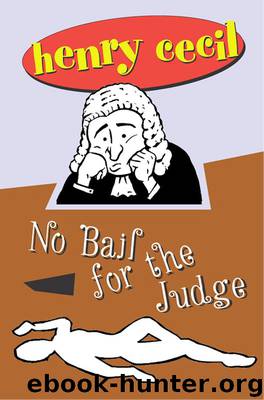No Bail for the Judge by Henry Cecil

Author:Henry Cecil
Language: eng
Format: epub
Publisher: House of Stratus
CHAPTER EIGHT
Judge in the Box
On the day on which the judge was to give evidence on his own behalf, the Lord Chief Justice had to make a decision in his own mind on a small point of procedure. It is the practice of some judges to refer to the man in the dock simply by his surname without any prefix of Mr (It is true that by accident when a knight or baronet is in the dock such judges may address him as “Sir George” but this is just a very understandable oversight.) It is thought by some that this practice is possibly rather unsatisfactory. A man, they say, is presumed to be innocent until he is found guilty. The unfortunate prisoner may have found himself in the dock as a result of a dreadful mistake or some wicked conspiracy. It may not have been his fault at all. He may be acquitted without a stain on his character. If he is not guilty when he leaves the dock, he was certainly not guilty when he went into it. Of course one may take the view that everyone who goes into the dock is guilty and that a number of lucky criminals manage to get acquitted. If officially adopted, that view would save a great deal of trouble as it would be unnecessary to try anyone. However, if one does not take that view and accepts the presumption of law that a man is innocent until he pleads guilty or is found guilty, it seems to some people a little difficult in principle to know why the witness (with three previous convictions) should be summoned to the witness box as “Mr Jones” and frequently called Mr Jones when he is addressed by counsel (and counsel certainly does not get reprimanded by the judge for calling such a witness “Mr Jones”) whereas the innocent prisoner who is about to be triumphantly acquitted should be called “Jones.” It is not to be thought for a moment that the prisoner Jones minds what you call him. He has much more important things to think about. It is some members of the public who mind and some members of the legal profession who mind. They consider that it is conceivable that this treatment of a prisoner – he is not Convict No. 99 and not Mr John Jones but something between – may unconsciously lower the prisoner slightly in the estimation of the jury, that it may tend in the very slightest degree to do something toward removing the presumption of innocence. If he is presumed innocent, why are the normal courtesies of life not extended to him? they may ask themselves.
On the way to Court a judge calls at a shop. “I wonder if I could speak to Mr Smith,” he says. Mr Smith is the manager.
“He is just going out,” says the assistant, “but I think he’ll be able to see you for a moment.” He finds Mr Smith, who is obviously in a hurry.
Download
This site does not store any files on its server. We only index and link to content provided by other sites. Please contact the content providers to delete copyright contents if any and email us, we'll remove relevant links or contents immediately.
| Coloring Books for Grown-Ups | Humor |
| Movies | Performing Arts |
| Pop Culture | Puzzles & Games |
| Radio | Sheet Music & Scores |
| Television | Trivia & Fun Facts |
Spell It Out by David Crystal(36117)
Professional Troublemaker by Luvvie Ajayi Jones(29663)
The Secret History by Donna Tartt(19092)
We're Going to Need More Wine by Gabrielle Union(19046)
Cat's cradle by Kurt Vonnegut(15357)
The Goal (Off-Campus #4) by Elle Kennedy(13674)
The Social Justice Warrior Handbook by Lisa De Pasquale(12190)
The Break by Marian Keyes(9368)
Crazy Rich Asians by Kevin Kwan(9292)
The remains of the day by Kazuo Ishiguro(9000)
Thirteen Reasons Why by Jay Asher(8912)
Educated by Tara Westover(8054)
The handmaid's tale by Margaret Atwood(7767)
Giovanni's Room by James Baldwin(7346)
Win Bigly by Scott Adams(7199)
This Is How You Lose Her by Junot Diaz(6887)
The Rosie Project by Graeme Simsion(6415)
Six Wakes by Mur Lafferty(6259)
The Power of Now: A Guide to Spiritual Enlightenment by Eckhart Tolle(5783)
